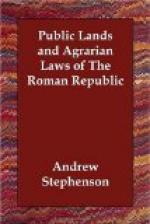According to Ihne, all lands in Rome were held by the above mentioned tenure until the enactment of the Icilian law de Aventino publicando which involved a change of tenure by converting the former dependent and incumbered tenure of the plebeians into full property.
[Footnote 1: De Officiis, I, 12; Gaius, Frag., 234: Digest, 50, 16.]
[Footnote 2: Varro, De L.L.V. 14; Plautus, Trinummus, Act I, Scene 2, V. 75; Harper’s Latin Dictionary; Cicero, De Off., I, 12: “Hostis enim apud majores nostros is dicibatur, quem nunc peregrinum dicimus.”]
[Footnote 3: Cic., loc. cit.; Gaius, Frag., 234.]
[Footnote 4: Forcellini, Lexic.; Harper’s Latin Lex.]
[Footnote 5: i.e. The descendents of a person escheated could bring no action for the recovery of the property.]
[Footnote 6: Giraud, Recherches sur le Droit de Propriete, p. 210.]
[Footnote 7: Gaius, Bk. II, 40.]
[Footnote 8: Ulpian, Frag., Title XIX, 4; Giraud, 216.]
SEC. 3.—AGER PUBLICUS.
In her early history Rome was continually making fresh conquests, and in this way adding to her territory.[1] She steadfastly pursued a course of destruction to her neighbors in order that she might thereby grow rich and powerful. In this way large tracts of territory became Roman land, the property of the state or Ager Publicus.[2]
This public land extended in proportion to the success of the Roman arms, since the confiscation of the territory of the vanquished was, in the absence of more favorable terms, a part of the law of war. All conquered lands before being granted or sold to private individuals were Ager Publicus[3] a term which with few exceptions came to embrace the whole Roman world.
This Ager Publieus was farther increased by towns[4] voluntarily surrendering themselves to Rome without awaiting the iron hand of war. These were commonly mulcted of one-third of their land.[5] “The soil of the country is not the product of labor any more than is water or air. Individual citizens cannot therefore lay any claim to lawful property in land as to anything[6] produced by their own hands.” The state in this case, as the representative of the rights and interests of society, decides how the land shall be divided among the members of the community, and the rules laid down by the state to regulate this matter are of the first and highest importance in determining the civil condition of the country and the prosperity of the people. Whenever but one class among the people is privileged to have property in land a most exclusive oligarchy is formed.[7] When the land is held in small portions by a great number and nobody is legally or practically excluded from acquiring land, there we find provided the elements of democracy.
According to the strictest right of conquest in antiquity the defeated lost not only their personal freedom, their moveable and landed[8] property, but even life itself. All was at the mercy of the conquerors. In practice a modification of this right took place and in Rome extreme severity was applied only in extreme cases, generally as a punishment for treason.[9]




